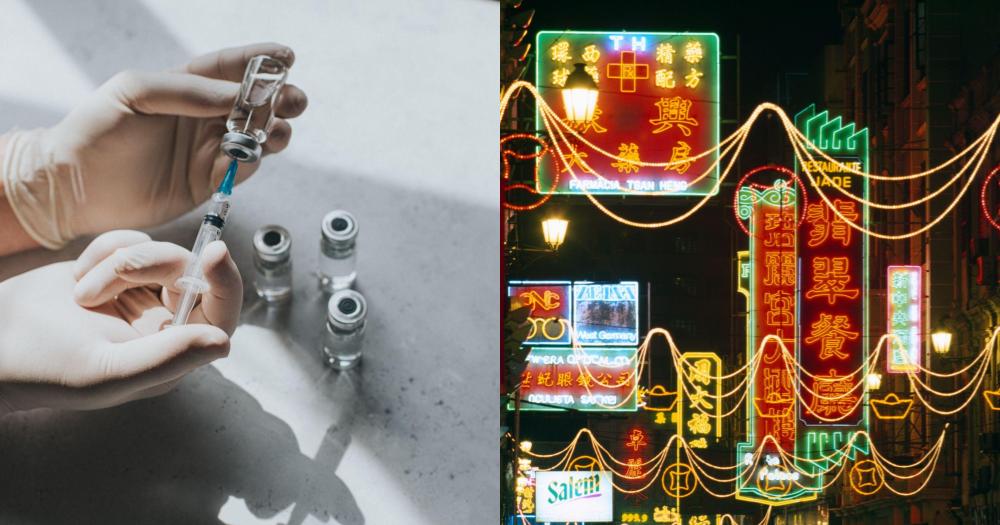Follow us on Telegram for the latest updates: https://t.me/mothershipsg
Chinese mainlanders have been reportedly crossing the border to get vaccinated in Macau and others are eager to do so in Hong Kong, as the latter also recently relaxed its vaccination rules to allow visitors to get the mRNA Covid-19 vaccine, according to Nikkei Asia.
Chinese-made vaccines only
China has been facing a reported rise in cases, coupled with some Covid-related deaths ever since its easing of Covid restrictions on Dec. 7.
Chinese President Xi Jinping was also reported to be unwilling to accept Western-made vaccines, despite China seemingly facing difficulties in trying to keep their Covid situation under control.
So far, China has not approved the use of any foreign vaccines, opting not to use mRNA vaccines developed in Western countries.
Instead, it has depended on domestically produced vaccines Sinovac and Sinopharm, which are based on older technology that uses the inactivated virus to elicit an immune response.
A Lancet study from Singapore, published in Dec. 2022, found that individuals who received three doses of the Sinovac or Sinopharm jabs were nearly twice as likely to develop severe Covid as people who received three mRNA jabs.
Those with the Chinese shots were also 50 per cent more likely to be hospitalised.
High demand for mRNA vaccines
However, both special administrative regions Macau and Hong Kong have been offering the Pfizer-BioNTech vaccines.
Some Chinese residents have therefore been visiting Macau to receive shots for the mRNA vaccine, viewed as more reliable and safer by some Chinese visitors.
A resident from Hangzhou reportedly paid US$1,200 (S$1,615) in travel expenses just to receive a Pfizer shot at the Macau University of Science and Technology Hospital.
He was quoted saying that he wanted protection with a “safe and reliable” vaccine and noted that he trusted foreign-made mRNA vaccines more due to the availability of information on them, according to Nikkei Asia.
According to Macau’s Covid Response Coordination Center, vaccine tourists are only eligible to receive the mRNA vaccine which targets the original coronavirus strain. The earliest availability is supposedly early February 2023.
A Chinese resident that Financial Times (FT) spoke to said that she received a first shot in Macau in Oct. 2022, but discovered that vaccination slots were fully booked until the end of December.
No refunds or rescheduling allowed, second vaccination site opened
Macau has reportedly set up a second vaccination site, Kiang Wu Hospital, to cope with the rising demand for vaccinations.
Those who want to be vaccinated must be ready to fork out up to 1,650 Hong Kong dollars (S$284) per shot, with no refunds or rescheduling allowed, according to Macau’s official appointment platform for Chinese mainlanders, Nikkei Asia reported.
According to the Financial Times (FT), Macau was the only place outside mainland China where residents can travel without quarantine rules, which would explain its popularity as a place to receive the mRNA vaccination.
Vaccination slots have reportedly been booked up rapidly, with a customer service official at the Macau hospital telling the FT that his phone has been ringing "non-stop".
However, this was before the latest report in the late hours of Dec. 26, that China would scrap quarantine for travellers from Jan. 8, 2023.
Waiting for quarantine-free travel
Fosun Pharmaceutical, the distributor of BioNTech vaccine in China, has said in a statement on Dec. 23 that it has received full regulatory approval from the Hong Kong government to administer shots for visitors to the special administrative region.
Hong Kong has also registered other available Covid vaccines as pharmaceutical products, making them available throughout the city.
According to Nikkei Asia, foreign mRNA vaccines are available free of charge to Chinese mainlanders in particular clinics in Hong Kong. Thus, many mainlanders are eager for travel restrictions and quarantine requirements to ease between the borders so that they can travel to the city to be vaccinated.
Belle Wu, a Shenzhen resident, told the media outlet that she would be making a vaccination appointment in Hong Kong immediately after quarantine requirements are scrapped.
She said that the BioNTech vaccine “ will have much weaker side effects than the Chinese vaccines and offer better protection in this round of infections."
On Dec. 26, Hong Kong Chief Executive John Lee said that the border with mainland China would begin to re-open before mid-January 2023.
Related articles:
Top images via Getty/Catherine Falls Commercial & Atlantide Phototravel
If you like what you read, follow us on Facebook, Instagram, Twitter and Telegram to get the latest updates.
